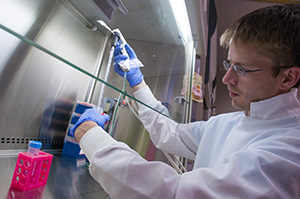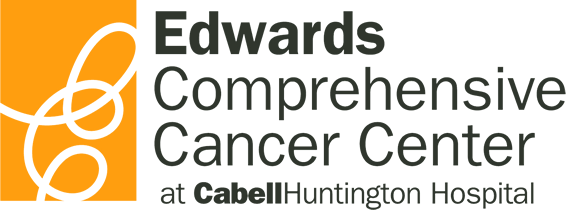Clinical Trials and Research
Many of today's most effective standard treatments are based on cancer research and the results of previous clinical studies. Ongoing research is essential in the fight against cancer, and it is one of the major objectives of the Edwards Comprehensive Cancer Center.
Clinical trials are designed to add to medical knowledge related to the treatment, diagnosis and prevention of a disease or condition. Examples include:
- Examining ways to identify or diagnose a particular disease or condition
- Evaluating medical devices or medicines for treating a disease or condition
- Finding vaccines or lifestyle changes that prevent a disease or condition.
- Identifying ways to improve the quality of life of people with a chronic illness
The results of these studies provide information about the benefits and risks of the products or interventions being tested, which will advance scientific knowledge and helps future patients
The Edwards Comprehensive Cancer Center supports a very active clinical trials program and maintains a listing of the clinical trials that are currently available.
Are clinical trials right for you?

The ACT website has unscripted video interviews with clinical trial participants.
If you or your loved ones have questions about clinical trials, please visit the ACT (About Clincal Trials) website. You'll find lots of information that addresses your concerns, and you can see unscripted video interviews with clinical trial participants, doctors, patient rights advocates and others. You'll learn about different factors to consider when deciding whether a cancer clinical trial is right for you. Reviewing the ACT website may help you feel better prepared to discuss clinical trials with your family and your healthcare team, and more confident in your decision about participating.
Visit the ACT (About Clincal Trials) website.
The Translational Genomic Research Institute
 The Charles H. McKown, Jr., MD, Translational Genomic Research Institute (TGRI), which is housed on the third floor of the Edwards Comprehensive Cancer Center, allows scientists to work in close proximity to clinicians, fostering collaboration. This 10,500 square foot facility supports the medical school and clinical researchers by enabling them to rapidly translate genome-based laboratory research into clinical applications that will improve patient care. The McKown TGRI offers the appropriate environment for performing leading-edge cancer research and conducting clinical trials that are helping to shape the future of cancer research — and not just in Huntington.
The Charles H. McKown, Jr., MD, Translational Genomic Research Institute (TGRI), which is housed on the third floor of the Edwards Comprehensive Cancer Center, allows scientists to work in close proximity to clinicians, fostering collaboration. This 10,500 square foot facility supports the medical school and clinical researchers by enabling them to rapidly translate genome-based laboratory research into clinical applications that will improve patient care. The McKown TGRI offers the appropriate environment for performing leading-edge cancer research and conducting clinical trials that are helping to shape the future of cancer research — and not just in Huntington.
